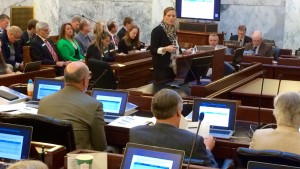A contractor auditing the Idaho Education Network found that more than half of schools surveyed weren’t using equipment purchased through the troubled state broadband contract.

Legislative Services Office manager April Renfro presented findings of the audit Thursday morning to the Legislature’s budget-setting Joint Finance-Appropriations Committee.
For the audit, contractors visited 30 of the 217 Idaho high schools that were utilizing the network at the time of the audit.
They found that 47 percent of those schools used the HD cameras, flat screen televisions, projectors, document cameras and video teleconference codecs purchased through the contract.
Additionally, auditors could not locate 6 percent of the purchased equipment that had been assigned to those schools. On Thursday afternoon, network officials said they located six out of eight of the missing pieces of equipment last week and are continuing work to locate the remaining two items.
Finally, a survey of 48 school district technology directors and administrators found that 48.8 percent of respondents did not offer interactive classes through the network and that 1.7 percent of students with broadband access enrolled in network classes in the spring of 2014.
Usage had peaked in the fall of 2012, when about 2.2 percent of high school students were enrolled in network classes.
“It appears that in talking to our school representatives that they not utilizing these assets as much we like them to,” Renfro said. “Overall, 47 percent is not a very high utilization rate.”
Former Senate Education Committee Chairman John Goedde, Gov. Butch Otter’s adviser on the broadband issue, attended Thursday’s JFAC presentation. Afterward, he said some of the reduction in use can be attributed to the voters’ rejection of Propositions 1, 2 and 3 in November 2012. When the State Board of Education’s online credit requirements were rescinded with the repeal of the propositions, fewer students enrolled in online classes through the network.
The audit report was released at a tumultuous time for the broadband system. District Judge Patrick Owen threw out the $60 million contract in November. The state had not been receiving federal “e-Rate” payments to support the contract since 2013 due to contract disputes.
State officials are preparing to re-bid the contract, but the bidding timeline likely means the state won’t be able to access e-Rate payments until July 2016.
In response to the audit, Rep. John Gannon, D-Boise, asked whether exercising local control and giving districts flexibility to choose whether or not to use the service made more sense than providing it to everyone.
Sen. Shawn Keough, R-Sandpoint, asked whether the audit findings could be extrapolated to give a reliable look at statewide usage.
Renfro replied that the sample size was large enough that those conclusions could be drawn if it was a financial audit. She said legislators could also order a follow up audit and instruct them to look at all schools and equipment from the network contract.
“If somebody looked at (the audit) in my school district, they would say 50 percent aren’t using the assets, so whey are we spending all this money on the program?” Keough said.
However, network spokeswoman Camille Wells cautioned that there were “a few inaccuracies” and “a few things that needed to be cleared up” in the audit. In a letter to JFAC members issued Thursday afternoon, Goedde clarified that funding for most of the technology equipment cited in the funding came from a combination of grants from the USDA Rural Utilities Service, the J.A. and Kathryn Albertson Foundation and the U.S. Department of Education’s Title II-D program. Federal stimulus funds and $24,167.19 from the state general fund accounted for the rest of the funding.
The Reno, Nev.-based certified public accounting and business advisory firm Eide Bailly performed the audit on behalf of the state.
Disclosure: Idaho Education News is funded by a grant from the J.A. and Kathryn Albertson Foundation.
